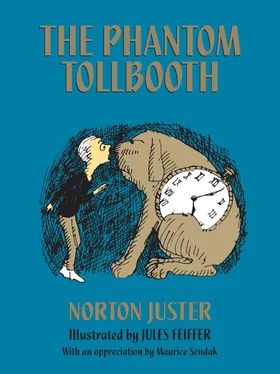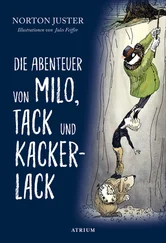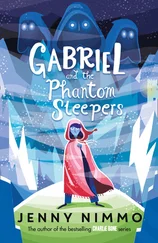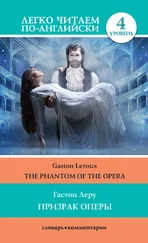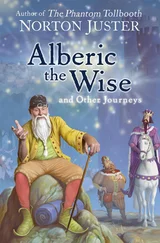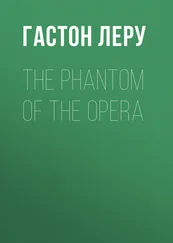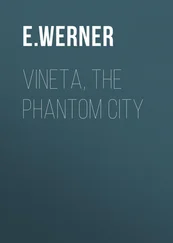“I beg your pardon?” said Milo.
“Buy or sell, buy or sell,” repeated the gateman impatiently. “Which is it? You must have come here for some reason.”
“Well, I——” Milo began.
“Come now, if you don’t have a reason, you must at least have an explanation or certainly an excuse,” interrupted the gateman.
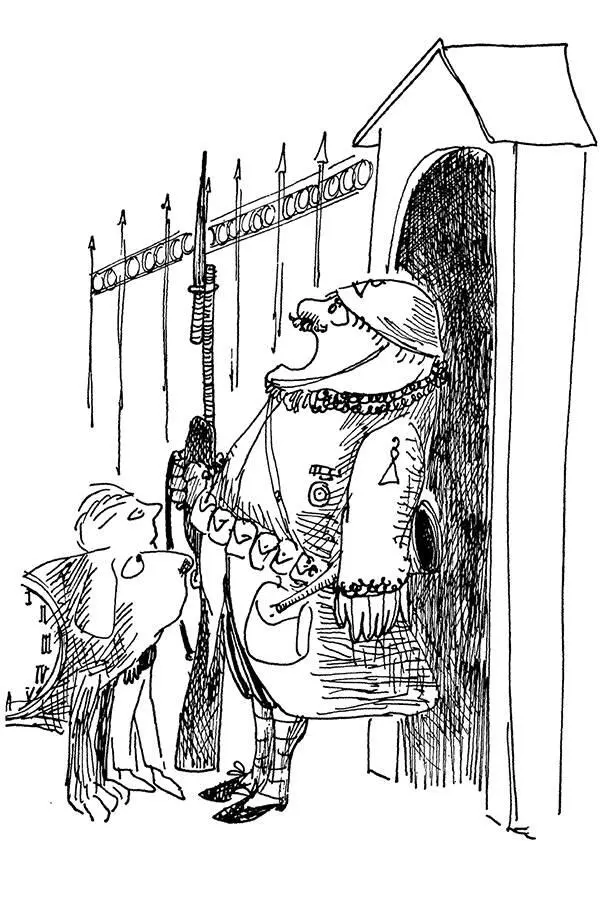
Milo shook his head.
“Very serious, very serious,” the gateman said, shaking his head also. “You can’t get in without a reason.” He thought for a moment and then continued. “Wait a minute; maybe I have an old one you can use.”
He took a battered suitcase from the gatehouse and began to rummage busily through it, mumbling to himself, “No … no … no … this won’t do … no … h-m-m-m … ah, this is fine,” he cried triumphantly, holding up a small medallion on a chain. He dusted it off, and engraved on one side were the words “WHY NOT?”
“That’s a good reason for almost anything—a bit used perhaps, but still quite serviceable.” And with that he placed it around Milo’s neck, pushed back the heavy iron gate, bowed low, and motioned them into the city.
“I wonder what the market will be like,” thought Milo as they drove through the gate; but before there was time for an answer they had driven into an immense square crowded with long lines of stalls heaped with merchandise and decorated in gay-colored bunting. Overhead a large banner proclaimed:
“WELCOME TO THE WORD MARKET”
And, from across the square, five very tall, thin gentlemen regally dressed in silks and satins, plumed hats, and buckled shoes rushed up to the car, stopped short, mopped five brows, caught five breaths, unrolled five parchments, and began talking in turn.
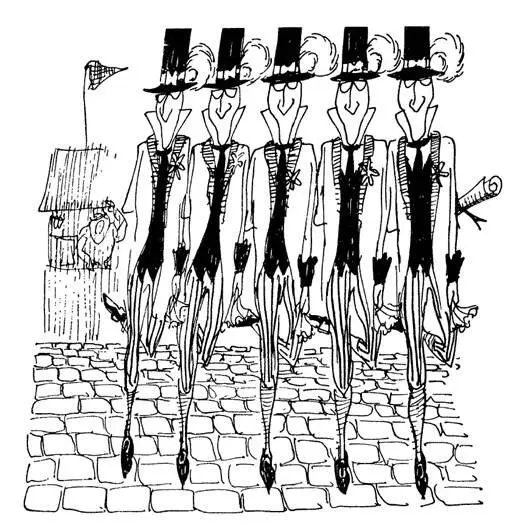
“Greetings!”
“Salutations!”
“Welcome!”
“Good afternoon!”
“Hello!”
Milo nodded his head, and they went on, reading from their scrolls.
“By order of Azaz the Unabridged——”
“King of Dictionopolis——”
“Monarch of letters——”
“Emperor of phrases, sentences, and miscellaneous figures of speech——”
“We offer you the hospitality of our kingdom,”
“Country,”
“Nation,”
“State,”
“Commonwealth,”
“Realm,”
“Empire,”
“Palatinate,”
“Principality.”
“Do all those words mean the same thing?” gasped Milo.
“Of course.”
“Certainly.”
“Precisely.”
“Exactly.”
“Yes,” they replied in order.
“Well, then,” said Milo, not understanding why each one said the same thing in a slightly different way, “wouldn’t it be simpler to use just one? It would certainly make more sense.”
“Nonsense.”
“Ridiculous.”
“Fantastic.”
“Absurd.”
“Bosh,” they chorused again, and continued.
“We’re not interested in making sense; it’s not our job,” scolded the first.
“Besides,” explained the second, “one word is as good as another—so why not use them all?”
“Then you don’t have to choose which one is right,” advised the third.
“Besides,” sighed the fourth, “if one is right, then ten are ten times as right.”
“Obviously you don’t know who we are,” sneered the fifth. And they presented themselves one by one as:
“The Duke of Definition.”
“The Minister of Meaning.”
“The Earl of Essence.”
“The Count of Connotation.”
“The Undersecretary of Understanding.”
Milo acknowledged the introduction and, as Tock growled softly, the minister explained.
“We are the king’s advisers, or, in more formal terms, his cabinet.”
“Cabinet,” recited the duke: “1. a small private room or closet, case with drawers, etc., for keeping valuables or displaying curiosities; 2. council room for chief ministers of state; 3. a body of official advisers to the chief executive of a nation.”
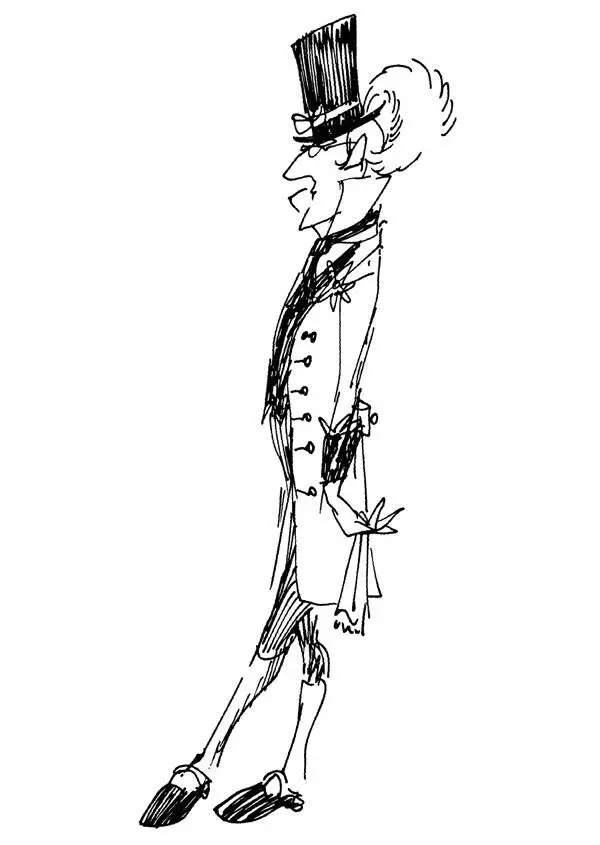
“You see,” continued the minister, bowing thankfully to the duke, “Dictionopolis is the place where all the words in the world come from. They’re grown right here in our orchards.”
“I didn’t know that words grew on trees,” said Milo timidly.
“Where did you think they grew?” shouted the earl irritably. A small crowd began to gather to see the little boy who didn’t know that letters grew on trees.
“I didn’t know they grew at all,” admitted Milo even more timidly. Several people shook their heads sadly.
“Well, money doesn’t grow on trees, does it?” demanded the count.
“I’ve heard not,” said Milo.
“Then something must. Why not words?” exclaimed the undersecretary triumphantly. The crowd cheered his display of logic and continued about its business.
“To continue,” continued the minister impatiently. “Once a week by royal proclamation the word market is held here in the great square and people come from everywhere to buy the words they need or trade in the words they haven’t used.”
“Our job,” said the count, “is to see that all the words sold are proper ones, for it wouldn’t do to sell someone a word that had no meaning or didn’t exist at all. For instance, if you bought a word like ghlbtsk, where would you use it?”
“It would be difficult,” thought Milo—but there were so many words that were difficult, and he knew hardly any of them.
“But we never choose which ones to use,” explained the earl as they walked toward the market stalls, “for as long as they mean what they mean to mean we don’t care if they make sense or nonsense.”
“Innocence or magnificence,” added the count.
“Reticence or common sense,” said the undersecretary.
“That seems simple enough,” said Milo, trying to be polite.
“Easy as falling off a log,” cried the earl, falling off a log with a loud thump.
“Must you be so clumsy?” shouted the duke.
“All I said was——” began the earl, rubbing his head.
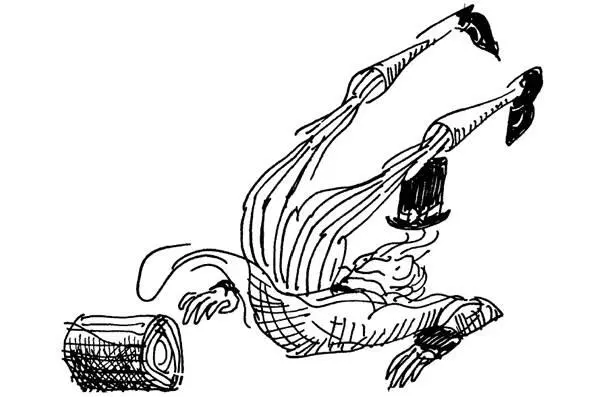
“We heard you,” said the minister angrily, “and you’ll have to find an expression that’s less dangerous.”
The earl dusted himself off as the others snickered audibly.
“You see,” cautioned the count, “you must pick your words very carefully and be sure to say just what you intend to say. And now we must leave to make preparations for the Royal Banquet.”
“You’ll be there, of course,” said the minister.
But before Milo had a chance to say anything, they were rushing off across the square as fast as they had come.
“Enjoy yourself in the market,” shouted back the undersecretary.
“Market,” recited the duke: “an open space or covered building in which——”
And that was the last Milo heard as they disappeared into the crowd.
“I never knew words could be so confusing,” Milo said to Tock as he bent down to scratch the dog’s ear.
“Only when you use a lot to say a little,” answered Tock.
Milo thought this was quite the wisest thing he’d heard all day. “Come,” he shouted, “let’s see the market. It looks very exciting.”
4. Confusion in the Market Place
Indeed it was, for as they approached, Milo could see crowds of people pushing and shouting their way among the stalls, buying and selling, trading and bargaining. Huge wooden-wheeled carts streamed into the market square from the orchards, and long caravans bound for the four corners of the kingdom made ready to leave. Sacks and boxes were piled high waiting to be delivered to the ships that sailed the Sea of Knowledge, and off to one side a group of minstrels sang songs to the delight of those either too young or too old to engage in trade. But above all the noise and tumult of the crowd could be heard the merchants’ voices loudly advertising their products.
Читать дальше
